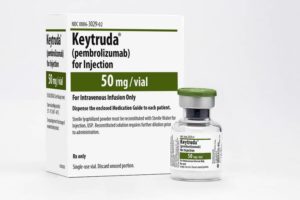
Credit: wsj.com
Researches have stopped a study of Keytruda (pembrolizumab) the immunotherapy drug that former president Jimmy Carter says helped stop the progression of his advanced melanoma, because the medication is so effective that they want to offer it to all the patients in the trial. The study, named KEYNOTE-024, tested Keytruda against a standard platinum-based chemotherapy in 305 lung cancer patients who had not yet been treated for their disease. Merck, the company that makes the drug, says it helped slow the spread of the patients’ tumors and helped them live longer overall.
The study was stopped on the recommendation of an independent committee, which has not yet shared details about the results. However, Dr. Pasl Janne, a lung cancer specialist at Harvard Medical School and Dana-Farber Cancer Institute, said in a statement to NBC News that he suspects the data was “significant enough that this will be a practice-changing finding.” Dr. Roger Perimutter, president of Merck Research Laboratories, added that the company looks forward to “sharing these data with the medical community and with regularity authorities around the world.”
Immunotherapy differs from standard chemotherapy in that it mobilizes the body’s own T-cells to fight cancer cells. Normally, T-cells fight cancer in part through the action of genes called anti-programmed-death-receptor-1 (PD -1) and PD-L1. But when cancer cells take control of the PD-1 pathway, they can “hide” from T-cells, preventing them from doing their job. Keytruda works by targeting the abnormal PD-1/PD-L1 proteins, thus allowing the immune system to function as it should. About 25 percent of lung cancers are associated with the PD-1/L1 abnormality, according to Dr. Natalie Azar, a contributor to NBC News.
Keytruda is generally less toxic than standard chemotherapy, but it can have serious side effects. The major risk is that it can cause the immune system to attack healthy organs and tissues, particularly the lung, colon, liver, kidneys, endocrine system and brain.
Keytruda is currently approved only as second-line treatment for patients with metastatic non-small cell lung cancer whose disease has advanced after other treatments have been tried. However, based on the results of the study, Merck plans to ask the Food and Drug Administration to make the drug available to patients who have not been treated yet.

 Immunotherapy drug Keytruda Tops Chemo in Lung Cancer Study
Immunotherapy drug Keytruda Tops Chemo in Lung Cancer Study




 The Spiritual Symbolism of Cardinals
The Spiritual Symbolism of Cardinals















my brother has 48 years old, NSCLC, with PD-L1, % of positive cell is 100%, and strongly positive. (in head (cerebellum), lymph nodes of the neck, thorax, abdomen, pelvis, and left femoral inguinal, both lungs, both adrenals)
He received 3rd dose of KEYTRUDA (intravenous 200 ml every 3 weeks, oct 26th, nov 17th, & dec 7th)
the results were superb
questions:
– I knew adverse reactions of Keytruda and I would like to know positive side effects that ensure the effectiveness of the drug in body and cerebellum
– is it possible to treat cerebellum tumor with other way of intravenous (direct injection in head for instance)
thanks
Report this comment
Hi khaldoun,
I’m the editor-in-chief here at SevenPonds so I’m answering for Ellary. I have some experience in caring for people with cancer, but I’m afraid your questions are beyond my or Ellary’s expertise. According the the product website, Keytruda is only given IV. There may be clinical trials in progress using other routes, but that’s something your oncologist would need to research. I’m not sure what you mean by “positive side effects;” but if you want to know more about the drug’s mechanism of action I think your brother’s doctor could explain that to you.
I’m thrilled that your brother has had a strong response to this drug. Immunotherapy is saving or extending many lives and I hope he continues to do well for a very long time!
Report this comment